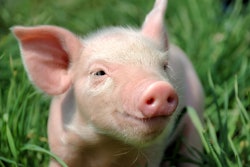
African swine fever (ASF) virus is unlikely to spread via animal feed, according to a new research project.
“As the virus is stable in the environment, it has long been assumed that it can also be transmitted via feed, water and other materials,” the Friedrich-Loeffler Institute (FLI) said in a press release.
The European Food Safety Authority (EFSA) initiated an international research project in 2022 in which the FLI, the Swedish Statens Veterinärmedicinska Anstalt (SVA) and the German Federal Institute for Risk Assessment (BfR) investigated the stability of ASF viruses on feed, bedding and mechanical vectors under practical storage conditions. For this purpose, 14 relevant agricultural feed and bedding materials were used: grass, grass silage, hay, bark, peat, wood shavings, maize silage, rape, barley, wheat, oats, straw, potatoes and fodder beet.
All materials were contaminated with the ASF virus and stored at five different ambient temperatures for up to nine months. The samples were analyzed at different times for infectious virus and virus genome residues. The researchers also looked at the possible role of three different species of blood-sucking arthropods, such as seiners, to find out how long the arthropods studied could harbor the virus genome and infectious virus after ingesting infectious blood.
The results show the spread of ASF viruses via animal feed is only to be expected in exceptional cases. Even after adding large amounts of the infectious virus to various feed and bedding materials, no infectious virus was detectable after a short time, said project coordinator Dr. Sandra Blome of the FLI. Only in cold-stored fodder beet and potatoes was infectious virus still found in some samples, even after a longer storage period.
“This is probably due to the fact that ASF viruses are particularly stable in cold and humid environments,” said BfR President Andreas Hensel.

















